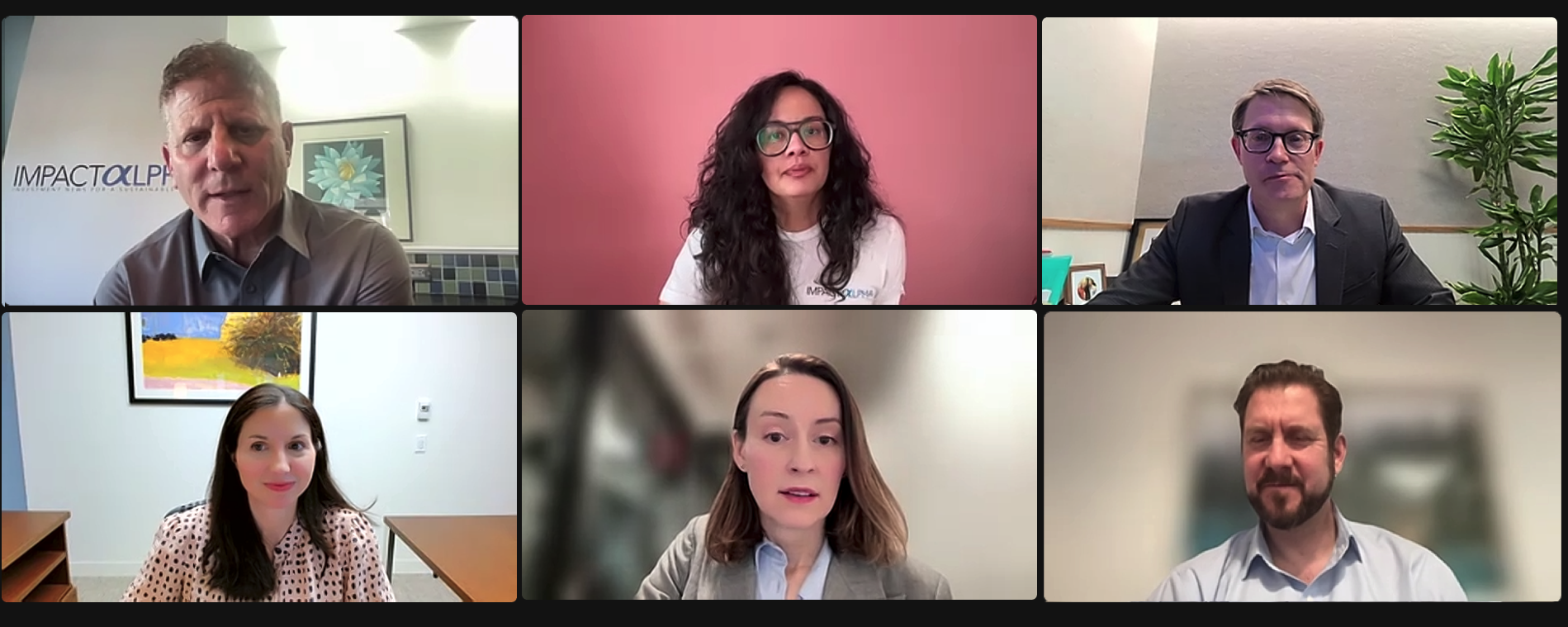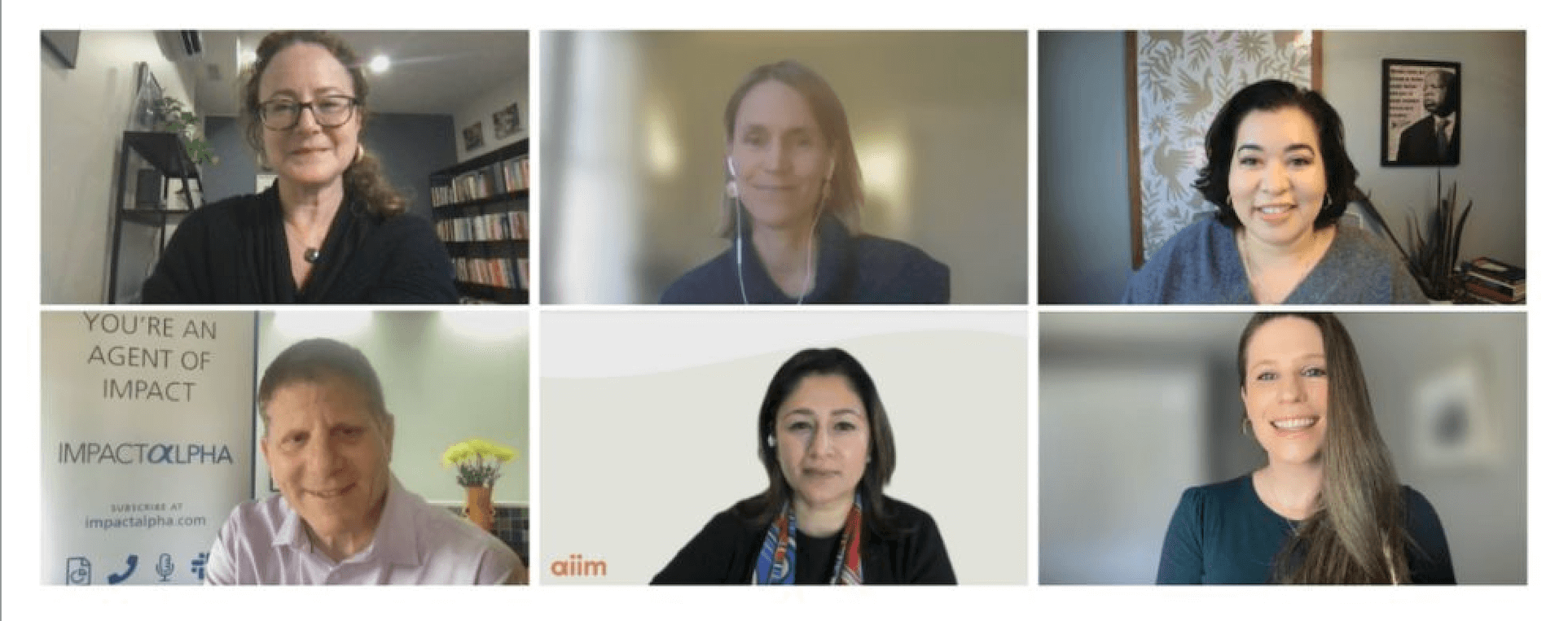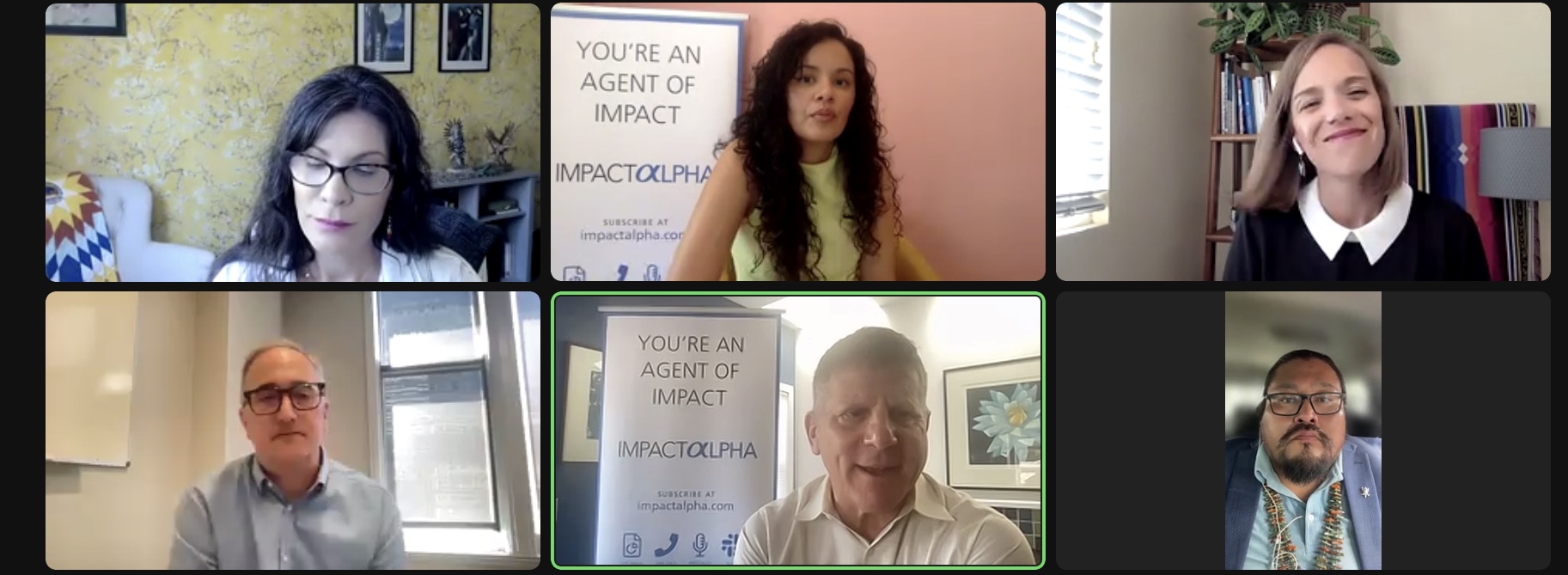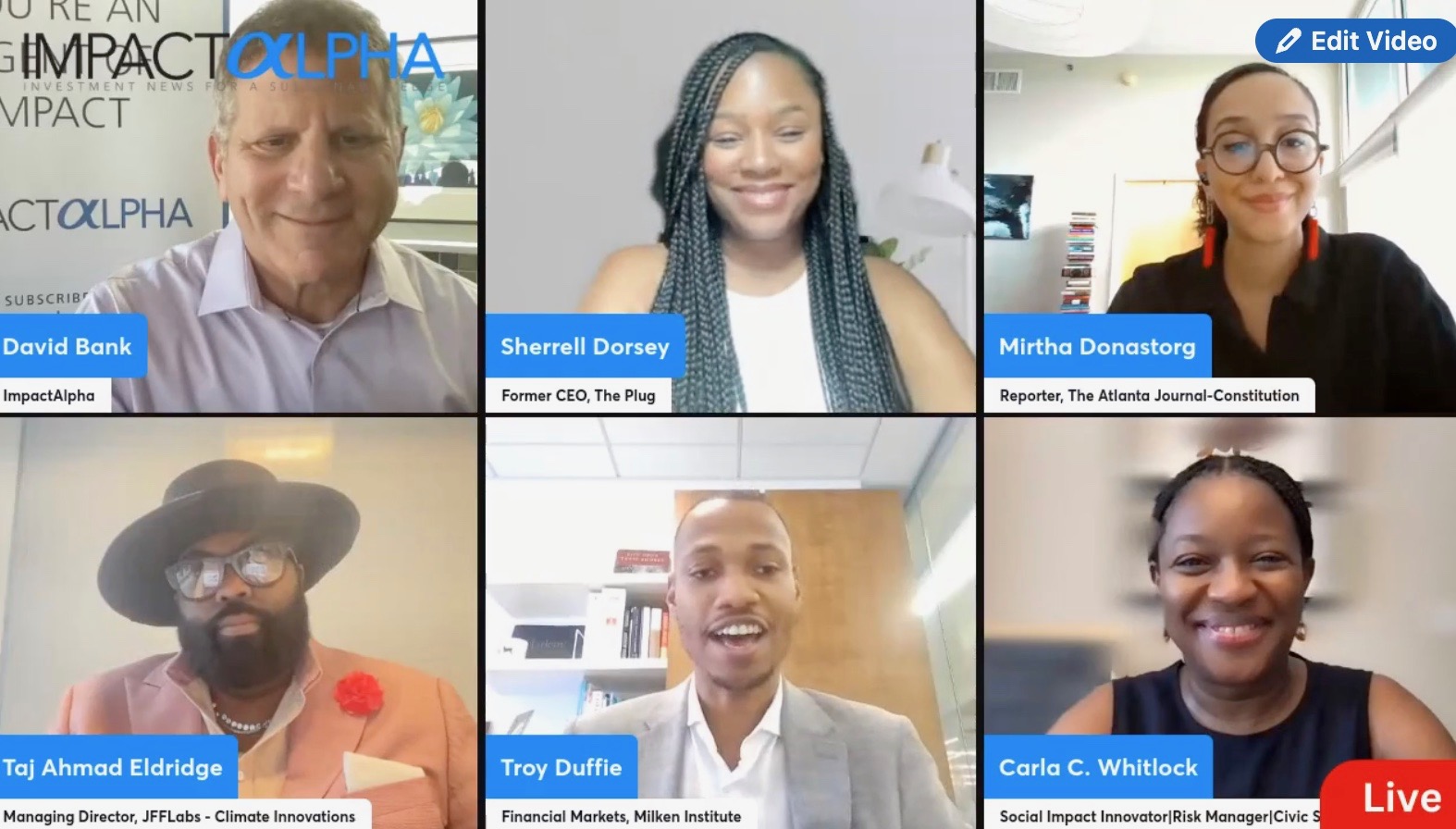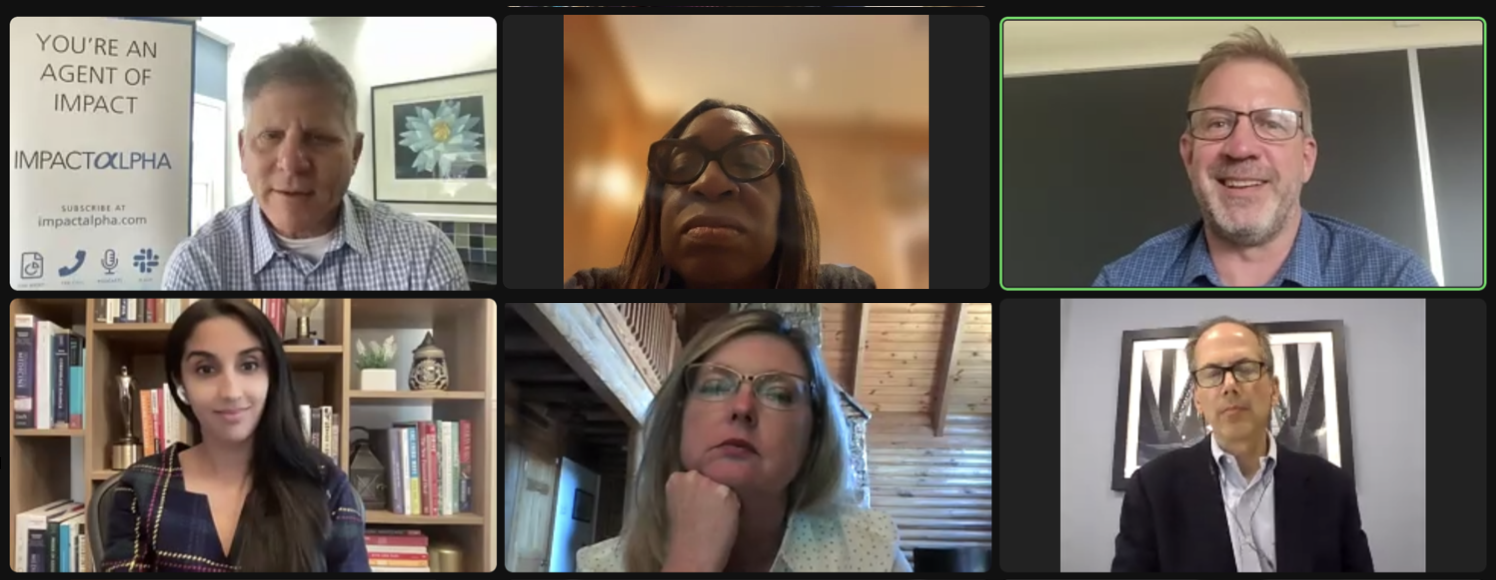ImpactAlpha, January 19 – Impact investors have for years debated the need for embedded structures to incentivize impact outcomes for impact fund managers. Structures like impact-linked carried interest for managers can be complicated.
But: “The excuses are really running out,” stated Aunnie Patton Power of The ImPact on this week’s Agents of Impact Call.
From the hundreds of ImpactAlpha subscribers who registered for the discussion, what’s clear is that questions of how (rather than whether) may be the main obstacle to broader adoption of such incentives. A new body of research, led by Patton Power, shares takeaways from more than 200 impact investors, fund managers and practitioners about the myriad of impact incentive structures that have arisen in the past 10-plus years. Nearly half of respondents have adopted impact-lined compensation mechanisms in the past two years.
Lessons are emerging from early fund-manager adopters like Vox Capital and ALIVE Ventures, or institutional investors like the European Investment Fund, from which representatives shared their experiences and learnings. Patton Power’s advice: Just start somewhere.
“It doesn’t have to be perfect,” she said. “If we had waited to understand what the best practices of impact investing were in order to start impact investing, we wouldn’t have 10-year-old funds.”
Peer learning
Impact incentives aren’t meant to be punitive; they’re meant to drive the people in mission-driven organizations to work toward their collective mission. The Impact Linked Compensation Project’s research highlights existing and emerging approaches that can be adopted no matter where you fit in the impact investing field.
For large investors like the European Investment Fund, a starting point is requiring fund managers to articulate their theory of change, and define metrics against which they can track their progress.
“That basically safeguards that the financial performance at the end of the investment period has been genuinely driven by an impact agenda,” said EIF’s Uli Grabenwarter.
Incentives apply to top of the food chain investors too. Within the European Investment Fund, a fund of funds within the European Investment Bank, “remuneration is tied exactly the same way to the performance of our underlying products as we require from [our portfolio] managers,” added Grabenwarter.
British International Investment has also integrated impact-based performance bonuses for its investment teams. Dutch impact fund of fund manager Wire Group links its carried interest to the impact performance of its impact-incentivized portfolio funds.
Flexibility and adaptability
Latin America-focused fund managers Vox Capital in Brazil and ALIVE Ventures, Acumen’s Colombia-based impact investing group, designed impact-driven incentives into their fund structures before there were many examples to follow. Recalibrating and fine tuning has been necessary.
“We tried to create something very robust from the beginning,” explained ALIVE’s Santiago Alvarez.
The organization’s first fund, raised in 2018, pegged part of its carried interest to the number of lives impacted. ALIVE found that the metric wasn’t equally relevant to or indicative of the impact of an education venture versus a healthcare venture or an agribusiness.
“Two years later, we felt that this structure was actually creating perverse incentives,” said Alvarez. ALIVE’s investors appreciated the organization’s learning process and allowed the team to make adjustments to the incentive structure. For its second fund, ALIVE sought to simplify its methodology by drawing from an established framework from the Impact Management Project.
“This flexibility is super important for you not to put yourself at risk—fiduciary risk or compensation risk,” said Vox Capital’s Gilberto Ribeiro. Vox also adopted impact-linked carried interest for its first fund and similarly had to go back to its limited partners to change the design.
Bjoern Struewer of Roots of Impact believes flexibility in impact incentive design is essential to deepening the impact and accountability of the field. “Even with the best of companies, there’s always something to improve in terms of specific impact objectives,” he said.
Roots of Impact has eight years of experience designing impact-linked “bonus payments,” called social impact incentives or SIINCs, for social enterprises to help them reach new customers and enter new markets. Unexpected events, particularly the pandemic, required adjustments to the deal terms for some of its enterprise partners.
“The idea is always the same: the better your impact, the lower your capital costs, and this really creates strong incentives on company level,” he explained. “And then you can really unlock the potential that is there.”
Personal incentives
Participants on the Call universally shared that their motivation for linking their compensation and incentive structures to their impact performance is driven by a desire to “walk the talk.” The more than 150 members of the impact community who joined the Call from Nigeria to Norway to the Netherlands and Berkeley to Boston to Baltimore expressed that you share that sentiment.
PearlBridge Capital Managers’ Olufunmi Adepoju in Lagos shared that she’s incentivized to see more women empowered in Africa.
DisAbled Life Alliance founder Paul Kent in Boston said he’s driven to facilitate meaningful change throughout the disabled community, “of which I am a proud member!”
Zebras Unite and Armillaria founder Astrid Scholz in Portland, Ore. said her daughter (and the next generation in general) is her biggest incentive “to keep at it.”
One Planet Ventures’ Lauren Burnhill in Porto, Portugal, provides impact organizations with investment and technical assistance in order to deliver greater impact in sustainable, green and gender finance.
Acumen’s Dan Waldron shared that the nonprofit venture fund uses impact-linked carry for all of its for-profit funds, as well as goal-based bonuses to incentivize staff around its impact mission.
Santa Barbara, Calif.-based Stefan Brewer, an MBA Student at Carnegie Mellon University’s Tepper School of Business said he’s incentivized to use impact tools to protect biodiversity.
Ibrahim Rashid, a sustainable investing analyst with Marquette Associates, said, “What motivates me? This space is just wicked fun.”
Agents of Impact
The Call was catnip to impact investing nerds looking for practical tips. More than 300 Agents of Impact registered for the call. Others who introduced themselves: Claire Morduch of Robert Wood Johnson Foundation’s impact investments portfolio… Billy Gridley is new to The Investment Integration Project…… Julie Menter, program director at Transform Finance, called in from Oakland, the land of the Lisjan Ohlone people… Sabari Raja is managing partner at JFFVentures, which invests in the economic mobility of low wage workers…
Aaron Bourke and Chintan Panchal joined from RPCK Rastegar Panchal, a mission-driven law firm based in New York. “Love this project, something we have looked at from a lot of different angles”… Adwoa Asare, director of the Turner MIINT experiential learning program at Bridges Impact Foundation is interested in emerging domestic and global trends to share with the MIINT’s cohort of 500 grad students and 4,500 alumni worldwide… Greg Beier of Susarb Sustainability Arbitrage is pricing sustainability in real time via full market disclosure… Sally Boulter joined from ImpactAssets.
Christophe Bochatay, head of ESG and impact at TripleJump, sent greetings from Geneva… Brian Vo from Connect Humanity is investing in broadband for low-income communities to bridge the digital divide… Cordell Jacks of Regenerative Capital Group, joined from Vancouver Island, Canada… Michael Casey of L1 Impact is a UK based impact investor with a focus on health and social mobility businesses… Ken Vaughn, director of impact investments at VertueLab, is doing impact-first investing in climate solutions and climate justice….
Magdi Amin, managing partner of African Renaissance Partners, invests in high-impact, seed-stage ventures in overlooked markets in East Africa… Jonah Zahnd is director of impact investing and sustainability special projects at Harvard Business School… Diederik Wokke is from Wire Group, a Netherlands-based impact fund of funds that links its carried interest to the impact it makes, “measured quantitatively through and impact money multiple framework and qualitatively through a framework we are compiling”…
Eliza Guinness from Dynamic Planet in Washington, DC “helps build conservation economies that benefit people, nature and climate through nature-based solutions”… Elena Casolari is a partner at OPES Italia, an Italy-based investor in local social impact enterprises… Hama Makino is a senior gender policy advisor at the US International Development Finance Corp… Emily Arnold works on Cambridge University’s Venture Investment Fund’s social ventures portfolio…
Megan Reilly Cayten from Climate Asset Management, wants models for increasing carry for impact outperformance (i.e. the carrot in addition to the stick). “It is hard for an asset manager to do that unless their LPs are on board and this is a very new topic for them”… Nish Acharya from Equal Innovation in Boston scouts startups for impact investors and foundations… Alan Lo from Sorenson Impact Institute appreciated the session “as it directly ties to some of the projects that we are involved in”… Julie Abrams, managing director of impact investments at NatureVest at The Nature Conservancy, has been tracking impact-lined incentives for years and is “thrilled it is becoming table stakes!”…
Apoorv Shukla, Asia Innovative Finance Advisor at USAID, dialed in from New York… Joan Larrea of Convergence Blended Finance reminds that “the impact of private sector investment often has a long tail”… Espen Daae from Ferd, a Norwegian family-owned investment company, is chair of the Norwegian National Advisory Board for Impact Investing… Jamie McInerney is from CrossBoundary Group, an investment firm focused on frontier and underserved markets… Dan Block is from Mercy Corps Ventures, an early stage impact VC focused on climate and financial resilience in emerging markets…
Chas Walker, CIO of Blue Oceans Finance in Atlanta, says his firm is currently in “stealth mode” (though maybe not anymore!). “We are a structured private credit platform driving impact in US urban markets by increasing capital access to small businesses and underserved entrepreneurs”… Eric Hensel is a longtime impact measurement professional formerly based in South Asia, the Middle East and Africa, and is now based in Slovenia. He’s starting new businesses blending advanced tech with niche impact areas… Andrew Mirie is a finance and operations professional in Nairobi, previously with Actis UK Private Equity and now looking for new opportunities… Lori Michaelson called in from the US International Development Finance Corp.




